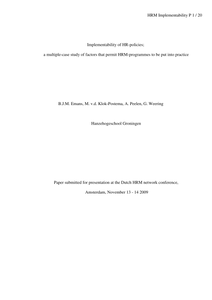This paper assesses the impact of perceived HRM practices on organisational citizenship behaviour (OCB) and whether leader membership exchange (LMX) mediates this relationship. The required research data were retrieved from four different departments within a logistics and supply chain management organisation. The results show that there is a significant relationship between the HRM practices as perceived by a subordinate and their level of organisational citizenship behaviour. The relationship that subordinates have with their frontline manager (LMX) acts as a significant mediator. In the final section, of this paper the findings are discussed and recommendations for future research and practical implications are given.
DOCUMENT

By means of an interview based multiple case study the impact of six manageable factors, called implementation levers, on the implementability of HRM programmes within organizations was investigated. The levers that were studied were: programme flexibility (opposite of programme standardization), programme embeddednes (fit with existing organizational processes), participative programme development (programme users being involved in the programme development), attention to politics (intra-organizational power relations being taken into account), HRM’s coworkership (programme users being supported by HRM department) and HRM’s accessibility (HRM department being contactable for programme users). The interview outcomes confirm the expectations about the impact of each of the levers. In addition to that, they articulate those expectations by highlighting a variety of mechanisms that explain the impact. They furthermore also point to instances of reversed impact, that is either a negative impact of the presence of a lever or a positive impact of the absence of a lever. Mechanisms that produced reversed impact were identified for all levers except HRM’s accessibility. The remaining ones thus can be said to have a bright side (as was expected) but a dark side as well.
DOCUMENT

In deze bijdrage wordt een analyse gemaakt van de rol van HRM in organisaties in de Nederlandse context. Dit artikel is gebaseerd op achttien casestudies, die zijn uitgevoerddoor studenten in de periode 2008-2011. De studenten zijn afgestudeerd bij het lectoraat HRM en Persoonlijk Ondernemerschap van Hogeschool Inholland.
DOCUMENT
